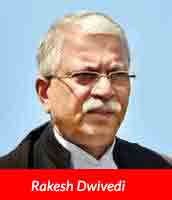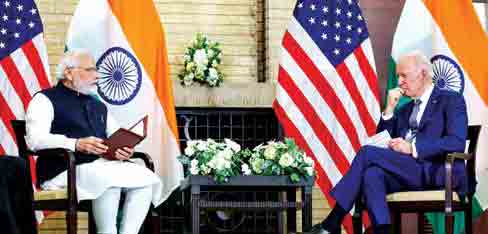 POST-WORLD War II, independent India chose to adopt the democratic path to which freedom fighters were committed. Even the UK saw that the enhancement of democratic quotient for democracy within and colonial despotism outside did not make a true democracy.
POST-WORLD War II, independent India chose to adopt the democratic path to which freedom fighters were committed. Even the UK saw that the enhancement of democratic quotient for democracy within and colonial despotism outside did not make a true democracy.
While the Indian democracy evolved within a federal structure, akin somewhat, to US federalism, the driving engine of development was the Prime Ministerial form of Cabinet system literally picked up from the British legal system. The two democracies have grown from strength to strength, various internal issues and important geo-political changes notwithstanding.
UK today houses large diaspora from different countries, particularly India. Its Parliament also has their representatives
Change, over the years
Over the course of previous 75 years globally societies have witnessed considerable metamorphosis. UK today houses large diaspora from different countries, particularly India. Its Parliament also has their representatives. Who could have predicted, or even conjectured, that in this course of period UK would elect a Hindu, though a staunch British Conservative, as its Prime Minister.
India too witnessed a great change of a different kind. The political monopoly of Congress, once the largest party, slowly eroded and during the last 10 years the erstwhile Opposition party BJP has been ruling at the Centre and several states.
Similar commitments
More than political governance, the two democracies have stood committed to protection and enhancement of human rights. The UK enacted the Human Rights Act 1998 and India enacted the Human Rights Act 1993.
In India, several fundamental rights – equality, free speech and expression, life and personal liberty, etc — are Constitutionally guaranteed. Though in both the countries breaches of human rights have been noticed, courts have been actively safeguarding the rights to an extent. This sphere remains a big challenge for the two countries. In the ultimate analysis, it is the people alone who can collectively guarantee rights for themselves.
Regional pressures
Human rights also include regional aspirations. Both the UK and India have regions with distinct culture, history, language, food habits and even religious inclinations. The distinctiveness creates pulls and pressures for self-governance and often presents challenges to maintenance of national integrity. So the search for fine balance becomes a continuous process.
In India, federalism was chosen to harness regional energies and balance regional aspirations with national integrity, while the UK has the ‘Devolved Governance’ model where the Parliament entrusts an extent of its power, large or small, to the regional government and even allows establishment of legislative assemblies for exercising the powers and regulating their affairs.
In essence, in both cases there is powersharing of some kind. Federalism in India is Constitutionally-protected by the doctrine of ‘Basic Structure’ and Supreme Court of India as a watchdog. Yet many states, having governments of non-BJP parties, protest against interference and non-cooperation of Centrally-appointed Governors and misuse of investigative agencies.
Charges flow to and fro. Courts spend considerable time resolving the Centrestate struggles. Notwithstanding these, the states enjoy freedom of governance under the Constitution and there are many states where the centrally ruling party has not been able to make inroads.
In the UK too, the idea of ‘Devolved Government’ essentially involves respect for regional aspirations, though juristically speaking the powers which “Devolved Governments“ exercise in Scotland, Wales and Northern Ireland are only powers of the UK Parliament. Theoretically they can be taken back, but practically the problem is of increasing grant of powers.
Integrity needed
Perhaps, the multi-nation theory haunts the UK. During 1938-1946 Prof Coupland, the Viceroys and the HMG pedalled this theory for India and the religion and cultural differences were equated with so many nations. That led to the Partition of India. The sagacity of the Constituent Assembly in adopting Constitutional federalism with uniform and substantial distribution of powers to states has succeeded in preserving India’s national integrity. Maybe the UK thinkers can take a look at this recipe.
The regional aspirants too need to pause their separatist buttons and consider whether in the fast changing geo-political scenario disintegration is at all a solution. The Ukraine-Russia war, the Chinese hegemonistic behaviour, and global economic stresses which nations face all compel us to ensure national integrity. It is time to strengthen democracy. Forces of democracy alone can enable peace globally and economic growth with equality. It is a fervent hope that Blitz India would contribute to that end.
















